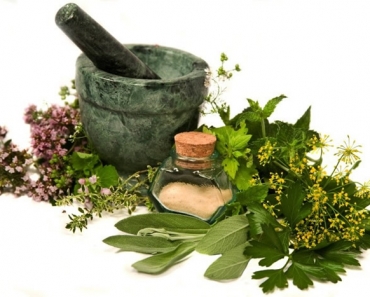Herbs have long been held in high esteem for natural hair care. Throughout history, herbs and other botanicals have been used in all kinds of hair-care products, from hair rinses and deep-conditioning treatments to remedies for dandruff, hair loss, and other scalp problems.
Herbs recommended for oily hair include sage and burdock. Herbs traditionally used for treating dry hair include calendula, comfrey leaf and root, and marshmallow root. Herbs appropriate for all hair types include chamomile, lavender, nettle, rose, and rosemary. Scalp irritations can be soothed with calendula, comfrey, or German chamomile, while dandruff can be helped with burdock, sage, nettle, or rosemary.

Teas made from fresh herbs and herb flowers along with lemon juice can be used as hair rinses.
Rinses and Conditioners
Rinses and conditioners are the best ways to bring the benefits of herbs to your hair. Many commercial shampoos tout the benefits of the herbs they contain. Although these herbal shampoos smell wonderful (and can lift your mood), they do little to truly improve hair health because they remain on your hair for just a short time.
For more lasting benefits, select herbal rinses and deep conditioners, which are left on your hair for a longer period of time and are therefore better able to coat and penetrate the hair shaft. Dry hair benefits from oil- and protein-rich deep-conditioning treatments.
You can use an herbal tea, or infusion, as a simple homemade hair rinse. Nettle, considered appropriate for all hair types, is one good choice. Or experiment with calendula, rosemary, sage, or other herbs. Adding vinegar or lemon juice to the infusion will help restore your hair’s natural pH. The vinegar scent dissipates quickly and will not remain in your hair.
Simple Herbal Hair Rinse
1 teaspoon dried herb or handful of fresh herbs (see the chart for suggested herbs)
1 tablespoon apple cider vinegar or lemon juice
Place the herb or herbs in a bowl and pour 1 cup of boiling water over the top. Add the vinegar or lemon juice and steep, covered, for 10 to 15 minutes. Strain, let the infusion cool to a comfortable temperature, and pour it through freshly shampooed hair. (Makes enough for one use.)
Moisturizing Deep-Conditioning Treatment
½ avocado (mashed), 1 tablespoon plain yogurt, or 1 tablespoon powdered milk
Egg yolk
1 to 2 tablespoons olive oil, coconut oil, or shea butter
In a medium bowl, combine the avocado, yogurt, or powdered milk and the egg yolk. Stir to thoroughly combine. Moisten the mixture with the olive oil, coconut oil, or shea butter. Work the conditioner thoroughly through your hair, paying special attention to the ends. Cover your head with a shower cap or plastic bag, and relax for 10 to 20 minutes. Rinse, then wash your hair thoroughly with a pH-balanced shampoo.
Herbal Hair Coloring
Herbs can be used to enhance hair color. The most important herbal hair dye comes from henna (Lawsonia inermis), used in Egypt, India, and the Middle East for at least 8,000 years to provide hair with shine and striking red highlights. Other herbs, such as turmeric and saffron (for yellow) and nettle (for green), were also used. Commercial henna hair dyes come in a variety of colors, but only true, unadulterated henna creates the red color. Black henna, for example, contains a synthetic black hair dye.
Henna is also used to create temporary tattoos that are an important part of traditional Indian wedding ceremonies. The longer the henna remains on your skin, the darker and longer lasting the tattoo will be. The henna dye soaks into the outermost layer of skin and coats the hair shaft, but it does not permanently stain skin or hair.
Various other herbs can be used to enhance natural hair color, even though they are not true dyes. For example, hair rinses that contain German and Roman chamomile are used to add shine and bring out highlights in blond hair. Rosemary and sage rinses are believed to help enhance the natural beauty of brunette hair.
Folk Remedies for Hair Loss
Hair loss (alopecia) can be a distressing problem for both men and women, although the condition is much more common in men. Herbal folk remedies reputed to help with hair loss abound, but there’s little scientific evidence that any one of them works. When a hair follicle stops producing hair, it’s difficult — if not impossible — to reverse the process.
Herbs that have garnered a traditional reputation for stimulating hair growth (or at least slowing hair loss) include aloe, burdock, chamomile, nettle, peppermint, rosemary, and sage. One small clinical study suggested that saw palmetto can help reverse genetic hair loss, including male-pattern baldness.
A traditional remedy for treating hair loss recommends massaging your scalp daily with an oil (such as olive oil) infused with rosemary. The biggest benefit of the treatment, however, could be the massage itself, which stimulates circulation to your scalp and hair follicles.



